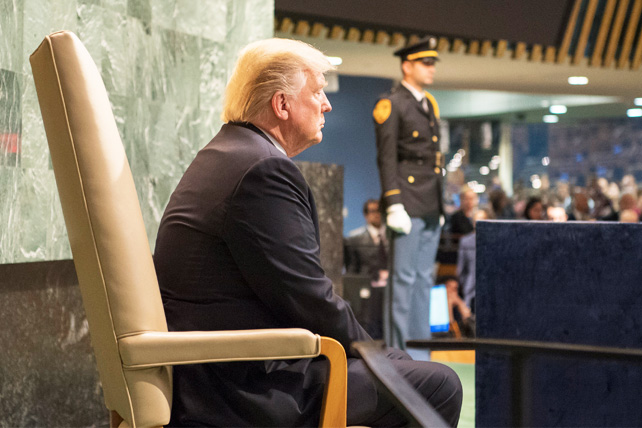In recent days, President Trump’s administration has successfully pressured many countries into endorsing a controversial document on drug policy, but resistance is growing among civil society.
President Trump is set to host an event on drug policy at the UN General Assembly on September 24. All countries that seek to attend the meeting were first required to sign a US-devised document – the Global Call to Action on the World Drug Problem (PDF). By signing the document, countries pledge to develop their own national strategies for addressing various drug policy issues, including to “cut off the supply of illicit drugs by stopping their production” and to prevent the “abuse” of illegal drugs.
The document and event are aimed at ensuring that the world continues to implement the war on drugs, despite the approach’s dangerous consequences for human rights and national security.
The Global Commission on Drug Policy (GCDP), an esteemed panel of political, business, and cultural leaders – including several former heads of state – denounced the Trump administration’s plans in a public statement:
“[The Trump administration’s document] signals the continuation of inefficient, costly and harmful policies. These policies result in punitive law enforcement, militarization, mass incarceration, forced treatment, and broken families and communities. Most important, they also result in loss of human dignity and lives.
Attempts to eradicate drug supply and use through prohibition-based repressive measures against people who use drugs have proved expensive and counter-productive for more than 50 years. The US government, which tried and abandoned alcohol prohibition, and now faces an unprecedented opioid crisis, should know this better than anyone – especially at a time when numerous states are moving away from [cannabis] prohibition and towards regulation.
The Global Call to Action represents an attempt to demonstrate a consensus that no longer exists, including among a number of the signatories.”
Indeed, some of the signatory countries were seemingly pressured to sign the document, unwillingly, due to fear of the consequences if they had refused to do so. As the Transnational Institute describes,
“Quite a few governments that have enacted progressive drug policy reforms have apparently decided to sign the U.S. ‘Call to Action’ — not because they agree with it, but because they prefer not to risk antagonizing Trump, who has already shown the world that he is both impulsive and vindictive. Often after intense debates and internal divisions, many countries have calculated that the risks entailed in signing such a statement were outweighed by the potential diplomatic consequences of not signing.
Indeed, for some countries, the threat is not merely implicit. As part of the annual U.S. drug cooperation “certification process” Trump last week pressured Mexico, Colombia, and Afghanistan to “redouble” their efforts “in stopping and reversing drug production and trafficking” or face U.S. sanctions. Countries such as Canada and Mexico find themselves in the midst of sensitive trade negotiations with the Trump administration, and may view signing the document as placation, not endorsement.”
One of the few countries that has refused to sign the document is New Zealand, under the leadership of left-wing Prime Minister Jacinda Ardern. Ardern said that she preferred a “health approach” to drug policy, saying “we want to do what works, so we are using a strong evidence base to do that. […] It's not our intention to [sign up] and there are a number of other countries who haven't either."
Norway's government has also declined to lend their support. Foreign Minister Ine Eriksen Søreide said "our assessment, together with the authorities in charge of drug policy in Norway, is that there is too little focus on the health side of drug policy". Norway has made moves towards a more progressive drug policy in recent times; the government recently announced it would be the seventh European country to legalise heroin-assisted treatment, as TalkingDrugs reported.
President Trump will open the UN event on September 24. Ironically, this coincides with the GCDP’s launch of its new report, Regulation: The Responsible Control of Drugs, which calls on governments to implement responsible drug regulation to weaken criminal organisation and take control of illegal markets.


